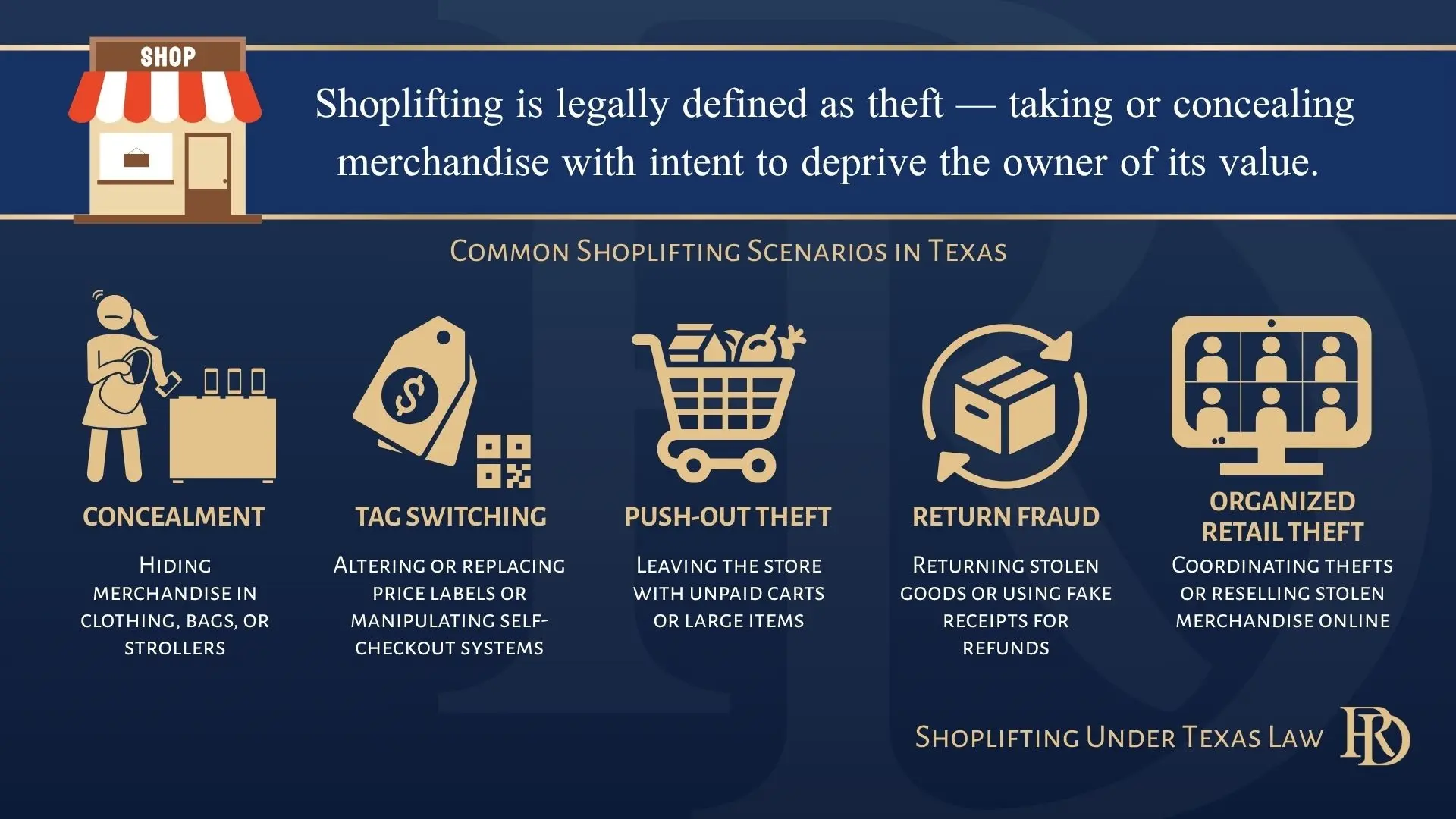
Round Rock Shoplifting Lawyer
A shoplifting arrest can spiral fast — jail, fines, and a record that scares off employers. If store security or police want a statement from you, don’t explain or apologize. Politely invoke your right to remain silent and ask to speak with Ryan H. Deck, an experienced criminal defense attorney serving Round Rock and Williamson County.
What Is Considered Shoplifting in Texas?

Under Texas law, shoplifting is theft — unlawfully appropriating property with the intent to deprive the owner. Prosecutors look for evidence of intent: concealment, removing tags, using a booster bag, passing all points of sale, or coordinating with others (organized retail theft). Even “I forgot to pay” cases can be charged if facts suggest intent.
Common Shoplifting Scenarios in Texas
- Concealment: Items hidden in clothing, a bag, a stroller, or a booster bag.
- Tag/SKU tampering: Switching barcodes, altering price tags, self-checkout manipulation.
- Push-out theft: Exiting with unpaid cart or bulk items.
- Return fraud: Returning stolen goods or using fake receipts.
- Organized retail theft: Coordinated thefts or reselling stolen property online.
Ryan H. Deck is a Board-Certified criminal defense lawyer and former prosecutor. He defends shoplifting cases across Williamson County with strategic, trial-ready advocacy.
Penalties for Shoplifting in Texas
Penalties scale up or down with the value of the stolen property and any criminal history. Prior theft convictions and tools (such as shielding or deactivation devices) can lead to harsher outcomes.
Enhancers: Prior theft convictions; organized retail theft allegations; using or possessing theft-detection shielding/deactivation devices; alleged force or threats (which can reframe a case as robbery).
Consequences of a Theft Conviction
Even a misdemeanor shoplifting conviction brings lasting fallout:
- Permanent criminal record: Employers conduct background checks; retail and financial roles are especially sensitive.
- Professional consequences: Licensing issues and loss of trust in positions involving cash handling or inventory.
- Financial burden: Fines, court costs, restitution, and possible civil demand letters from retailers.
- Immigration risks: Theft is a crime of moral turpitude that can jeopardize visa or residency status.
- Reputation damage: Community stigma and online court records that are hard to outrun.
Strategies Against Shoplifting Charges

Every case turns on the facts, video, and loss documentation. Effective defenses may include:
No Intent to Steal
One of the strongest defenses in a shoplifting case is the absence of intent. Many alleged incidents stem from simple mistakes — such as distraction, confusion at self-checkout, or accidentally walking past registers. If the evidence doesn’t show a clear intent to permanently deprive the store of property, the prosecution’s case weakens significantly.
Ownership or Claim of Right
A misunderstanding over ownership can lead to wrongful accusations. If you genuinely believed the property was yours — for example, a mixed-up bag, receipt confusion, or legitimate return — that belief can negate criminal intent. Texas law requires proof that you knowingly took property that didn’t belong to you.
Mistaken Identity or Faulty Video Evidence
Retail surveillance footage is often grainy, poorly angled, or lacks context. When multiple people are present or the footage is inconclusive, identifying the true suspect becomes difficult. We challenge unreliable eyewitness testimony and unclear recordings to cast reasonable doubt on the prosecution’s claims.
Inventory and Loss Inaccuracies

Stores sometimes inflate or miscalculate the value of stolen merchandise to push charges into higher categories. We review inventory logs, receipts, and chain-of-custody records for inconsistencies or policy violations. Any errors in valuation or recovery documentation can be used to reduce or dismiss charges.
Illegal Stop or Detention
Security personnel must follow strict procedures when detaining suspected shoplifters. If they used excessive force, lacked probable cause, or obtained statements without reading your rights, that evidence may be inadmissible. Challenging unlawful searches and detentions can lead to the suppression of key evidence.
Charge Reductions and Alternative Outcomes
Even when evidence exists, your case may qualify for lenient resolutions. We negotiate for deferred adjudication, restitution agreements, theft awareness classes, or community service to keep your record clean. These alternatives can prevent a conviction and preserve your future opportunities.
Why Hire Attorney Ryan H. Deck

When facing shoplifting or other theft-related charges in Williamson County, the attorney you choose can directly impact your freedom, record, and reputation. Ryan H. Deck offers:
- Former prosecutor insight: Before becoming a defense lawyer, Ryan served as an Assistant District Attorney in Montgomery County. His experience on the other side of the courtroom allows him to anticipate prosecutorial tactics, identify weaknesses in the state’s case, and use that insight to his clients’ advantage.
- Texas Board-Certified in criminal law: Board Certification by the Texas Board of Legal Specialization is a rare and respected credential that recognizes mastery in criminal defense. This certification confirms Ryan’s proven success in trial litigation, legal knowledge, and commitment to excellence in criminal law.
- Personalized attention: Unlike large law firms that pass clients between associates, Ryan works personally with every client from start to finish. He takes the time to understand your story, evaluate all possible outcomes, and build a defense that fits your circumstances and goals.
- Strategic defense: Ryan’s defense strategies focus on finding those openings and leveraging them to achieve dismissals, reduced charges, or diversion programs. His goal is to protect both your immediate freedom and your long-term record.
- Proven results: With numerous case dismissals, charge reductions, and favorable verdicts to his name, Ryan has established himself as one of Williamson County’s most trusted criminal defense attorneys. Clients rely on his consistent results and unwavering commitment to justice when their future is on the line.

Target

Arrested for Shoplifting? Lawyer Up!
One conversation with store security or a detective can sink your case. Get immediate, confidential guidance from Ryan H. Deck before you speak to anyone.

Start Your Defense Today
Accused of shoplifting in Round Rock or Williamson County? Early intervention can make the difference between a conviction and a clean record. Complete this form to request a free, confidential consultation with Ryan H. Deck. Tell us what happened, and we’ll review your case, explain your options, and help you take the right next step.


Commonly Asked Questions
This is some text inside of a div block.
Is shoplifting always a felony in Texas?
No. It depends on the value of the property and prior convictions. Under $2,500 is typically a misdemeanor; amounts over $2,500 or enhancements can be felonies.
Will the store drop charges if I pay for the items?
Not necessarily. Payment or restitution helps, but the decision rests with the prosecutor, not the retailer. It can still be helpful in negotiations.
Can first-time shoplifting be dismissed?
Often possible. Options may include deferred adjudication, classes, community service, or restitution — case-dependent.
Will this show up on background checks?
Yes. A theft conviction creates a permanent criminal record. Avoiding a conviction (or later sealing/expunction when eligible) is key.
Do I have to talk to store security or the police?
No. You have the right to remain silent and to request an attorney. Politely decline questions until you’ve spoken with counsel.
What if the video looks bad?
Video can mislead. We challenge context, timing, value, and intent — and scrutinize whether the stop and detention were lawful.


